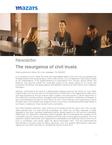
The resurgence of civil trusts
In our previous column, called The slow and imperceptible death of the civil trust, we exposed how the legal effects of this ancestral figure, which is still in force in our civil legislation, were being violated by the interpretations of the Superintendence of Corporations who, through various theses and positions, was ignoring outright the unseizable nature of the assets subject to civil trusts. We concluded, at that time, with great sadness and disbelief, that the end of the road for such institution had begun.
However, and thanks to the work of a distinguished colleague and civil law friend, Dr. Juan Pablo Fajardo Rojas, the civil trust rose from its ashes like the Phoenix Bird. This happened this week when said legal professional, through several rights of petition and other figures of citizen intervention in the construction of public policies, managed to get the Superintendence of Notaries and Registry to issue Administrative Instruction N. 06 of March 15, 2017, which defines, with crystal clarity, what is the legal nature of the assets with respect to which a civil trust is constituted and the legal effects of such figure, in particular, those concerning its unseizability.
Such Administrative Instruction, when referring to the treatment that this figure has in the civil law, states textually that "it is clear that the transcribed rule, which has not been expressly or tacitly repealed by any other, expressly establishes that the assets subject of a civil trust are unseizable. Additionally, it is important to emphasize that the legislator did not contemplate any exception to the unseizable nature as long as all the constitutive elements of the trust property are present. Thus, the registrars of public instruments, with respect to the unseizability of the assets by virtue of which a civil trust is constituted, must strictly apply the above-transcribed rules". And the aforementioned Administrative Instruction ends by stating, gloriously, that "The present administrative instruction repeals any (sic) other instruction or concept that may be contrary to it".
The issuance of this regulation has several implications, namely: (i) it leaves without any effect, by express provision of the same, the concepts of any government entity that are contrary to it, including therein those of the Superintendence of Corporations, (ii) it orders the officials in charge of carrying out the public registries to disregard any type of judicial or administrative attachment that concerns a property subject to civil trust, (iii) it imposes, tacitly, (iv) opens the way for those who feel that their rights have been violated due to the irregular seizure of their assets subject to trust, to sue the State for the compensation of their damages.
Although the Administrative Instruction does not say anything new different from what is expressly established in articles 807 and 1677 of the Civil Code, it is highly refreshing -in the legal sense of the expression- that the Superintendence of Notaries and Registry enforces the will of the legislator and the clear spirit of the law, which had been overshadowed by the Superintendence of Corporations. It may be that the latter entity complies with the imperative mandate given by the Superintendence of Notaries and Registry, otherwise, such reluctance would only generate more legal insecurity.


